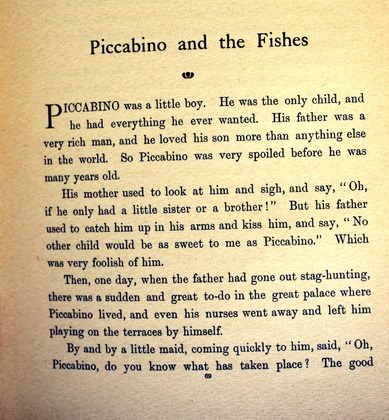Christianity and Moral Didacticism
Mrs. Charlton Anne’s ‘Piccabino and the Fishes’ is a morality tale which advises its young readership against the perils of selfishness and self-importance. The protagonist is a spoilt Prince, so perturbed by the arrival of a new sibling that he ‘made up his silly little mind’ (p.70) to run away in order to hold his parents’ attention. From the outset Piccabino is condemned by the narrator as ‘jealous and foolish’ (p.70), but on his journey he undergoes moral trials which ameliorate his character: in the ‘Land where Deeds but not Words were the language of the people’ (p.73) he makes an effort to befriend other children on their terms, and in doing so becomes popular, ‘contented […] and most unselfish’ (p.73); when he is lost in the ‘Sea of Good Resolves’ (p.78), alone and close to drowning, he learns humility by realising ‘what little importance he was to anyone beyond himself’ (p.85),
Ultimately Piccabino returns to his family, changed by his adventure ‘from a selfish, consequential boy into a thoroughly good fellow’ (p.87), and welcomes his baby brother. This fairy tale is perhaps notable for the fact that it addresses a common familial issue, sibling rivalry inspired by the arrival of a new baby. The moral guidance of this tale, therefore, is both general and applied to a specific household situation. The emerging nuclear family and the importance of maintaining a healthy, happy dynamic was a burgeoning concern for Victorian society, and as such this text is particularly relevant to the period.











